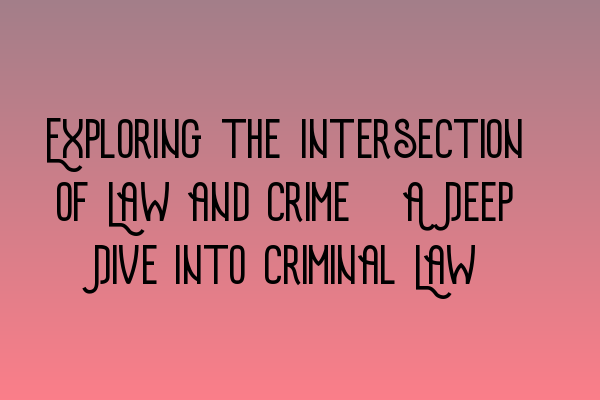Exploring the Intersection of Law and Crime: A Deep Dive into Criminal Law
Introduction
Navigating the intricate web of criminal law can be a daunting task for both legal professionals and the wider public. As criminal solicitors, it is our duty to shed light on the complexities and intricacies that shape this fascinating legal realm. In this blog post, we will embark on a deep dive into criminal law, shedding light on its various aspects and exploring the fascinating intersection between law and crime.
Understanding Criminal Law
Criminal law, also known as penal law, is the branch of law that deals with crimes, offenses, and their punishments. It encompasses a wide range of activities that are considered harmful to society, including murder, theft, assault, fraud, and many more. Criminal law aims to establish a framework to maintain order and protect the wellbeing of individuals within a society.
The Role of Criminal Solicitors
Criminal solicitors play a crucial role in the criminal justice system. They are legal professionals who specialize in defending individuals or entities accused of criminal offenses. Their primary responsibility is to provide legal guidance and representation to their clients. A skillful criminal solicitor can investigate the details of a case, gather evidence, build a strong defense, and ensure a fair trial for their client.
The Criminal Trial Process
Let’s now delve into the criminal trial process, which is vital in ensuring justice is served. It can be broadly divided into five stages:
1. Investigation: At this early stage, law enforcement agencies gather evidence and conduct interviews to build a case against the accused.
2. Arrest: If the authorities believe they have substantial evidence, they may arrest the suspect, who is then formally charged with a criminal offense.
3. Pre-trial Proceedings: During this phase, the defense and prosecution present their arguments and evidence. The judge determines if there is sufficient evidence to proceed to trial.
4. Trial: The accused stands before a judge or a jury, and the evidence is presented by both sides. The defense aims to prove their client’s innocence, while the prosecution seeks to establish guilt beyond a reasonable doubt.
5. Sentencing: If the accused is found guilty, the judge will impose an appropriate sentence, taking into account the severity of the crime, any mitigating factors, and the defendant’s background.
Key Principles in Criminal Law
Several key principles underpin criminal law and ensure fairness in the judicial process:
1. Presumption of Innocence: Every individual is presumed innocent until proven guilty in a court of law. This principle protects individuals from unfounded accusations and shifts the burden of proof onto the prosecution.
2. Right to Legal Representation: Every accused person has the right to legal representation. This ensures that even the most vulnerable members of society have a fair chance to defend themselves against criminal accusations.
3. Reasonable Doubt: The prosecution must prove the accused person’s guilt beyond a reasonable doubt, leaving no room for significant doubt in the minds of the jury or judge.
4. Equality Before the Law: Criminal law must be applied equally to every person, regardless of their social status, wealth, or background. No one is above the law, and everyone should be subject to the same legal processes.
The Ever-Evolving Nature of Criminal Law
Criminal law is a dynamic and ever-evolving field. It adapts to societal changes, technological advancements, and legal precedents. With the rapid growth of technology, cybercrime has become an emerging branch within criminal law. Solicitors specializing in this field must keep themselves updated on the latest online threats, data protection laws, and international regulations.
Conclusion
Criminal law stands at the intersection of legality and criminal activity, showcasing the intricate balance between individual rights and societal order. As solicitors specializing in criminal law, we strive to protect the rights of our clients and ensure the fairness and integrity of the judicial process. By understanding the fundamental principles, stages, and evolving nature of criminal law, we can navigate this complex system and contribute to a just and equitable society.
Contact SQE Criminal Law & Practice Law UK for expert legal guidance and representation in criminal matters. Our dedicated team of professionals is committed to upholding justice and providing excellent legal representation.
